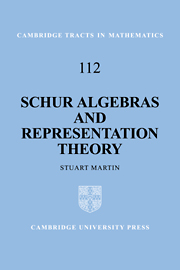Book contents
- Front matter
- Contents
- Introduction
- 1 Polynomial functions and combinatorics
- 2 The Schur algebra
- 3 Representation theory of the Schur algebra
- 4 Schur functors and the symmetric group
- 5 Block theory
- 6 The q-Schur algebra
- 7 Representation theory of Sq(n, r)
- Appendix: a review of algebraic groups
- References
- Index of Notation
- Index of Terms
3 - Representation theory of the Schur algebra
Published online by Cambridge University Press: 22 September 2009
- Front matter
- Contents
- Introduction
- 1 Polynomial functions and combinatorics
- 2 The Schur algebra
- 3 Representation theory of the Schur algebra
- 4 Schur functors and the symmetric group
- 5 Block theory
- 6 The q-Schur algebra
- 7 Representation theory of Sq(n, r)
- Appendix: a review of algebraic groups
- References
- Index of Notation
- Index of Terms
Summary
The aim of this chapter is to discuss the representation–theoretic aspects of the Schur algebra, Sr. Fulfilling a promise made in 1.6, we construct explicitly a complete set of irreducible Sr-modules indexed by the dominant weights Λ+(n, r). After our study of bideterminants and codeterminants in previous chapter, most of the work has already been done. We define left and right Schur and Weyl modules as certain Sr-modules having bases consisting of standard bideterminants or codeterminants with shapes in Λ+(n, r).
In 3.3 we prove the fundamental fact that Sr is a quasi-hereditary algebra, which means roughly that Sr can be filtered by certain (Sr, Sr)-bimodules V = S(λ) indexed by dominant weights and that for each λ ∈ Λ+(n, r) there is a factorisation V ≅ Vλ ⊗ λV as (Sr, Sr)-bimodules into right and left weight spaces of V. The modules Vλ and λV are precisely the left and right Weyl modules, and constitute the standard modules in the highest weight category PK(n, r) (see CPS [1988b]). Taking duals we re-discover the fundamental filtration appearing in 2.5, which had been obtained by DeConcini et al. some dozen years before anyone had thought about such categories. The sections of this filtration are then seen to be the Schur modules i.e. the costandard modules in the highest weight category PK(n, r).
- Type
- Chapter
- Information
- Schur Algebras and Representation Theory , pp. 59 - 88Publisher: Cambridge University PressPrint publication year: 1994



